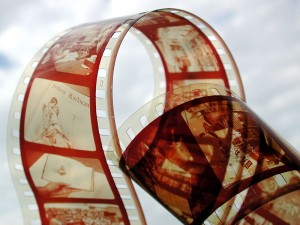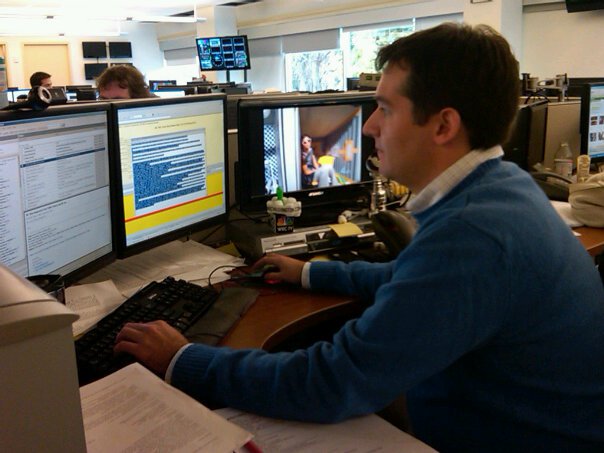Archive for March, 2011
 “We haven’t fully taken advantage of the medium,” said Mark Potts, commenting on the vast world of the Internet. “We haven’t fully taken advantage of the medium,” said Mark Potts, commenting on the vast world of the Internet.
Mark Potts, creator of RecoveringJournalist, his blog, came in to speak to our class today! He offered some useful opinions on great ways to tell stories.
Potts began with Patch.com.
“It’s important because it’s close to you,” said Potts, referencing hyperlocal news and why it’s a big deal. “The Washington Post doesn’t cover it.”
Then, Potts pointed out why bloggers blog. The passion for journalism was quite alive and vibrant back in the days of the Vietnam War and the Watergate incident, but nowadays, it’s not nearly as strong.
Professor Klein, though, pointed out that bloggers are the driving force behind the passion these days. They write because they want to write.
Sites with data collection Potts went over:
- Nate Silver’s blog, FiveThirtyEight, is seriously interesting stuff. Titled off of the number of seats there are in the electoral college, the Web site examines political data and makes predictions. In short, the site is to “give the best possible objective assessment of the likely outcome of upcoming elections.”
- Very, very cool.
Groupon is definitely a useful tool as well, says Potts.
Twitter, though, isn’t. “It’s good for keeping an eye on what’s going on, but I just don’t find it that interesting. It’s too much stuff, and it’s not that interesting.”
What is the most important tool for journalists, according to Potts?
“THIS,” he said, holding up his smartphone.
And lastly, while speaking about a journalist and their work, Potts believes in “getting it right the first time.” Sure, a writer can tinker with their work endlessly, but, generally, write stuff “that’s ready to go.”
 No Comments »
No Comments »
 Al Jazeera English, the world’s first English-language news channel headquartered in the Middle East, has a young employee, Kevin Anderson. He Skyped with us in class today! 🙂 Al Jazeera English, the world’s first English-language news channel headquartered in the Middle East, has a young employee, Kevin Anderson. He Skyped with us in class today! 🙂
Headquartered in Doha, Qatar, he chose Al Jazeera English because he “is trying to cover the Middle East from the Middle East.”
ZeeMaps is a Web site that Anderson highly recommended.
Regarding sound in video, Anderson points out that bad camerawork is forgivable, but bad sound is not. Always make sure that you have good, if not great, sound.
Regarding the usefulness of Storify, make sure that there’s content. Just make sure that it makes sense. Put the sources in context.
The major role of social media is “networked journalism”:
- It’s not enough to build a Web site anymore
- You must congregate people online
- Some of it’s about distribution
- Use networks to add sources and voices to the story
“I know how to de-mine a field with a Bic pen,” said Anderson, commenting on his “journalism bootcamp” training.
 No Comments »
No Comments »
 Director of Community Engagement Steve Buttry for TBD.com was in class with us today! Director of Community Engagement Steve Buttry for TBD.com was in class with us today!
Buttry started by showing us a social media project that the Star Tribune worked on in mid- to late-2007. It involved a slide show of pictures and sounds that depicted the I-35W bridge collapse in Minneapolis, Minn. The bridge used to cross over the Mississippi River.
He then pulled up a picture that showed the entire bridge, crumbled. Virtually every story (just over 100 in total) from everyone involved was included in this picture in the form of numbers on the picture. A viewer could just click on the number and hear/see that person’s account/experience of the event.
THAT’S good storytelling. THAT’S something I would want to read.
Another project he showed us was one the Des Moines Register worked on about the tornado that wiped out Parkersburg, Iowa. The piece, which can be seen here, collected many of the town’s security camera’s footage when the tornado struck. Certainly a fascinating (and breathtaking) way to see the damage for an outsider.
Next, he showed us satellite before-and-after photos of the recent Japan tsunami disaster that was posted on the New York Times Web site. That project, which was possibly the most striking, is here.
The Gigapan site he showed us, though, is something I could seriously look at all day long. Absolutely incredible. This is hilarious, too. This, too.
All of these were shown to us to prove that “if you do the biggest and best stuff” you will reap the rewards. Respect will be earned simply due to the clear effort is put into a project — if you put a lot of effort into a project, more likely than not, it shows and readers WILL take note.
Buttry closed with advising to always be curious — “If a question occurs to you, ask that question.”
“Never say no for somebody else,” Buttry also recommends. There’s no reason to ever turn anyone down for a good quote.
Buttry’s blog, the Buttry Diary, can be found here.
 No Comments »
No Comments »
“Unless you are a so-called early adopter, you probably find it impossible to keep tabs on all the latest and greatest tools and services available online.”
Briggs advises first and foremost:
- Organize your e-mail
- Find the right personal productivity tools
Data driven journalism:
- Every story is a field of data
- Telling stories with data
 No Comments »
No Comments »
 Briggs’ eighth chapter explains: Briggs’ eighth chapter explains:
- Capturing quick video highlights, not documentary projects
- Managing digital video on your computer
- Using common software to edit video
- Choosing online video hosting services
- Driving audience to your video
“The best way to build a solid video story is to think about it the same way you would think about writing.”
- Use different approaches for different projects
- Try storyboarding
- Mix your shots
- Build five-shot sequences: Close-up on the hands/Close-up on the face/Wide shot/Over-the-shoulder shot/Creative shot
Being a film major at GMU, this is definitely the most chapter that I found the most interesting. It didn’t really teach me anything, per se, but it’s still beneficiary.
I really liked that Briggs pointed out to “aim for solid, not spectacular clips” – I can definitely see how this would apply in good pieces.
 No Comments »
No Comments »
 News 4 employee Jim Iovino was with us in class today! News 4 employee Jim Iovino was with us in class today!
At the start of class, he brought up this video of News 4 weatherman Pat Collins interviewing “Sandwich Girl“:
- On that day, every other channel is covering the storm — how could they make it interesting? Or, at the very least, MORE interesting than the other guy?
Iovino suggested finding an angle to any story that you don’t think anyone else has seen or thought of:
- Journalism is always changing, so make it interesting!
- It’s good, basic journalism
- It starts with the questions, it starts with the story
Capital Games is a NBC Washington blog dedicated to finding and “covering the biggest personalities in DMV sports” that Iovino works on, too.
Advice on your clips:
- Strip it down to the bare minimum — don’t add unnecessary banners/bookmarks, anchors or music
- By saving your viewer time, you’ll help to ensure that they’ll come back to your Web site
- “Just like a good picture can speak for itself, video can do that, too.”
Lastly, Iovino put out his thoughts on the future:
- The newspaper isn’t as necessary as the electronic version of it — one screen is better than many pages
- Professor Klein even asked the class who doesn’t think that newspapers will last much longer. A lot of people raised their hands. Then, he asked which of us personally subscribed to a major newspaper. One person kept their hand raised
 No Comments »
No Comments »
Course: WORD 26 1-003 in George W. Johnson Center, Room 311B. 1-003 in George W. Johnson Center, Room 311B.
Described as follows: “Covers the intermediate level of Word 2007.”
Microsoft Word 2007 has, for a while, been something I’ve felt pretty competent with. However, I definitely learned a thing or two from this workshop!
In the first lesson, aptly named “Inserting Dates and Symbols,” we learned how to put dates and symbols into our paper.
Then, we went over Quick Parts and how that tool can make things quicker for writers that consistently use titles/pictures in their pieces. Additionally, the Building Blogs Organizer, which helps users sort building blocks by name, gallery, category or type, was pretty interesting.
The third lesson dealt with using AutoFormat in Word 2007. AutoFormat can format a document as the user types — it analyzes the user’s text as they type and then applies the appropriate formatting.
Lesson 4, “Working with Tables,” helped me apply the use of tables into my work, which is a useful way to throw a bunch of information into a clean, organized area of space.
Related to the use of tables, Lesson 5 was probably the most beneficial of all of the lessons. I learned about aligning table text, merging cells within a table and converting a table into text.
 No Comments »
No Comments »
 Course: RSCH 110-005, in Fenwick Library, Room A214. Course: RSCH 110-005, in Fenwick Library, Room A214.
Described as follows: “Zotero is a Firefox browser based utility that makes capturing bibliographic content from around the Web a snap! Learn how to install and manipulate your own Zotero library.”
Right now, Zotero only works through Firefox. It helps you “collect, organize, cite and share your research sources,” according to their official Web site. It recognizes sources immediately off of database Web sites — users can instantly select the sources and add them in their Zotero folder, straight from the database.
Exporting your library of sources is quite simple, too. Users even have the option to include their notes for each source along with their files. APA and MLA citations (among others) are accounted for when exporting, too, and they can even be assigned separately to different sources.
Personally, one of my favorite features right off the bat was the ability to create a timeline of your sources. It made it so simple to spot exactly when the source was written. Additionally, if you’re working off of multiple computers while researching, you can make an account on the Zotero Sync Server to bring back up all of your previously saved research. It truly saves a lot of time — just make sure you sign out!
Also, in Zotero, adding something manually has been given a new twist. From Instant Messages to films, from bills to maps, just about anything can be cited. When users have no idea how to cite something but really want to add it in their piece somehow, Zotero will figure it out.
 No Comments »
No Comments »
 Sen. George Allen In a C-Span video conference with George Mason University students, former Virginia Governor and former U.S. Senator George Allen discussed what it means to relate the U.S. government to sports. This time, though, he’s stepping up his own game — to be reelected in 2012.
Allen outlined to the class the reasons he believed he lost his 2006 reelection for the Senate to his opponent, Democrat Jim Webb. He stressed that the “digital divide” was a main reason, stating that, without taking advantage of the Internet, he didn’t stand a chance against Webb.
Allen continued into what he learned in the years later. He said that, with knowledge, the United States can compete against other countries — knowledge of the high demand for electricity and ways to conserve it. Creating jobs within the United States will ensure that money will stay in the United States.
“Oil and gas, we have it in this country,” he said.
A strong defense, Allen states in his book “What Washington Can Learn From the World of Sports,” wins championships. In his talk to the class, he compared the United States today to a game that was currently being played. “Common sense” ways to conserve energy were one of his strongpoints in a strong defense for our nation. Specifically, teleworking and utilizing our limited resources were his primary suggestions.
Further, Allen states that in the Middle East, if one wants “a free and just society,” freedom of religion, freedom of expression, private ownership of property and the rule of law must be implemented into society.
“If the French can [recycle nuclear waste], so can Americans,” said Allen, concerning France’s recent technical advancements to reduce and reuse nuclear fuels. He believes that, by using the following steps that the French took, it will help create jobs for Americans as well.
For someone who was, years ago, inspired by Ronald Reagan to get into organized politics, Allen appears to have done his homework. He clearly cares about the Commonwealth of Virginia. As a Representative, a Governor and a Senator, the man is going to stick around for a bit more.
http://www.youtube.com/watch?v=T4iLPZnortE feature=player_embedded
 No Comments »
No Comments »
 Jon DeNunzio User Engagement Editor Jon DeNunzio of the Washington Post
- Former Web Sports Editor
- Former Prep Sports Editor
- Didn’t major in journalism (Graduated from the University of Virginia in 1991)
- Went to the Washington Post in 1994
Integrating Social Media into Your Journalism:
In Nationals Park in summer 2009, DeNunzio worked with the Post to channel tweets from attendants at the Park onto a single Web site. The idea never really took off, but it’s a great idea nonetheless. Perhaps with a tweaked formula, it would’ve skyrocketed.
Another idea Denunzio incorporated into some Post stories includes adding a question at the end of some stories, asking readers to tweet their answers. For instance, “What happens when mean girls grow up?” This would work ridiculously well with my story on the football team! Being that George Mason has the largest head count of students than any other school in Virginia, this story, without a doubt, would blow up on Twitter.
The two big I’s of Internet are Immediacy and Interactivity.
WHY WE USE SOCIAL MEDIA:
- It’s where users are
- It allows us to build a relationship with users
- It helps our reporting
Marshall McLuhan said that “the medium is the message.”
“No, it’s the social, the social media,” Denunzio said. He said that you don’t have to use social media in order to be social.
DeNunzio’s point, simply put: Be social with your users whenever you can.
- Use a poll (Twiigs.com, DeNunzio suggests, is totally worth it)
- Pay attention to comments
- Ask for ideas (AllOurIdeas.org)
- Ask for photos
- Host a debate
- Answer user questions
- Use the knowledge of the crowd
WHY HE’S TALKING ABOUT THIS:
- Come up with ideas to connect with users! It will put you ahead of the crowd.
- Because of the Internet and because of its interactivity, we must take advantage of the users on it.
- User engagement and data visualization are key nowadays. Do not underestimate or ignore them.
- Startupli.st
 No Comments »
No Comments »
|
 “We haven’t fully taken advantage of the medium,” said Mark Potts, commenting on the vast world of the Internet.
“We haven’t fully taken advantage of the medium,” said Mark Potts, commenting on the vast world of the Internet.








 Entries (RSS)
Entries (RSS)